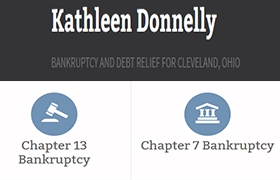Cleveland Workout Lawyer, Ohio
Sponsored Law Firm
-
 x
x

Click For More Info:
-
Law Office of Kathleen Donnelly
526 Superior Ave #1030 Cleveland, OH 44114» view mapChapter 7, Chapter 13, Free Evaluations Need Debt Relief? Contact Me Today
There is hope for debt relief. At the Cleveland, Ohio, law office of Kathleen Donnelly, we help people like you to escape from under mountains of debt.
800-413-4100
Frederic Paul Schwieg
Commercial Bankruptcy, Workout, Reorganization, Bankruptcy
Status: In Good Standing Licensed: 39 Years
Thomas Mark Delventhal
Real Estate, Bankruptcy & Debt, Banking & Finance, Workout, Transactions
Status: In Good Standing Licensed: 33 Years

 Kathleen Donnelly Cleveland, Ohio
Kathleen Donnelly Cleveland, Ohio About UsKathleen Donnelly
About UsKathleen Donnelly Contact UsCall or Email Right Now
Contact UsCall or Email Right Now
